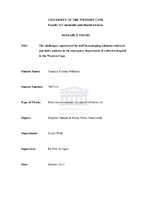| dc.description.abstract | Staff members of a district hospital experience various challenges in managing psychotic patients in the emergency department. Psychosis can result from the use of illicit drugs. Persons presenting in a psychotic state due to use of illicit substances are common at emergency departments of district hospitals. In terms of the South African legislation, mental health services are accessible at general district hospitals with the 72-hour observation period being mandatory. Emergency departments are the first area where behaviourally disturbed and psychotic persons are assessed and managed in terms of the Mental Health Care Act of South Africa (Act No. 17 of 2002). Emergency staff members render a 24-hour service to all public users requiring emergency services, and should have
the skills, training and resources necessary to manage any public user presenting for emergency services. A large proportion of the patients presenting with psychosis at the hospital where the study was done, were reported as using illicit substances. This study sought to discover and understand: What are the challenges experienced by staff members in managing substance-induced psychotic patients in the emergency department of a district hospital? In an attempt to answer the research question, the aim of this study was to explore and describe the challenges experienced by emergency department staff members in managing substance-induced psychotic patients in a district hospital in the Western Cape. An explorative and descriptive research design was used, grounded in the qualitative research approach. Ten staff members managing or assisting with managing substance-induced psychotic patients in the emergency department were purposefully
sampled. This sample comprised doctors, nurses, and other support staff members, such as security guards, porters and general workers. An interview schedule guided the face-toface semi-structured interviews as the method of data collection. The digitally recorded data from these interviews were transcribed verbatim, and analysed into six themes as well as sub-themes. Data were analysed according to Tesch, as cited in Creswell (2009). Measures to ensure trustworthiness were adhered to, such as neutrality, consistency, truth value, and applicability.
Ethical considerations were closely followed, such as obtaining permission from the
Senate Higher Degrees of the University of the Western Cape and the Provincial Health Ethics Committee, participants’ gave voluntary written consent to partake in the study, aware of the right to withdraw at any time, and of their anonymity and confidentiality being maintained through the use of pseudo names. The findings of the study were that the emergency department was inappropriate for the managing of acutely psychotic or behaviourally disturbed patients such as these, particularly if these staff members were not adequately trained, and where there were staff shortages. Though there was recognition of these patients’ rights to obtain medical care, fear and resentment accompanied by stress on the part of staff presented throughout the themes. The study yielded recommendations such as the need for training and debriefing of staff members and support by hospital management, as well as services such as groupwork and supportive services to patients and family. Recommendations were also made for a review of staffing, infrastructure,
facilities and legislation. These recommendations are considered important to assist in the planning, and implementation of healthcare services to mental healthcare users, with specific reference to substance-induced psychotic patients. | en_US |

